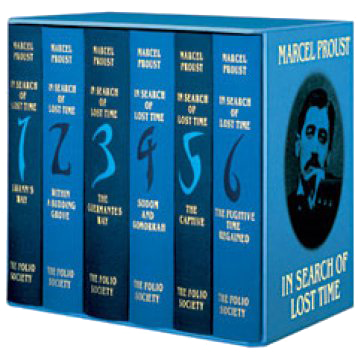


"In Search Of Lost Time" - box set
A review of "In Search Of Lost Time" by Marcel Proust
"The Search For Lost Time" is a LONG book. It will take you a long time to read it. But if you have any pretensions to literary erudition it is something you must do. Like Joyce's "Ulysses" it is worth ploughing through, if only to be able to brag that you have read it, and to be able to hold your own with anyone else who can similarly brag, and thus be able to instantly rise above the dross at any intellectual dinner party or to impress the librarian at your local library when you nonchalantly ask for book 12. Like "Ulysses" there is plenty of meat in it, and plenty to enjoy and reflect upon, but it is massively flawed, and it is difficult to read many pages at a sitting.
It is essentially a picture of Parisian high society around 1900, interspersed with Proust's distilled wisdom on same. Distilled wisdom is all very well, but it dependeth greatly upon the quality of the wisdom. Proust's wisdom varies.
Would you buy a car on the recommendation of someone that doesn't drive? Proust spends much of his time musing on love, yet he was a twisted, mummy's boy homosexual in real life and didn't ever achieve a full, liberating, two-way, long-term, loving, sexual relationship with either sex, hence his wisdom on such matters is pathetically inadequate. For example: one of his truisms is that the girl only wants you when you don't want her, an obvious cry from the heart of a love that never got properly started. All the romances that Proust concentrates on in the book end in dismal failure, again this clearly shows the author's sad experience, rather any insight into real love. On the other hand, when he is observing from a distance many of his arrows hit the mark, such as: that a man in love will lose his discernment for sake of his beloved, no matter how worthless he or she may be.
It is Proust's observations of society that make this work so famous. Since he was a member of that society, and an introvert, he was well placed to observe it. His picture of the Counts and Countesses, the Monsieurs and Madames, the servants and prostitutes, the artists and musicians, the dinner parties and balls, the poofters and lesbians, the town houses and seaside resorts and, most importantly, the intrigue and sub-text behind it all is fascinating.
The book is certainly deep. Every page provides at least one piece of wisdom to muse upon. This is good, but it makes it slow to digest, and it is bad when the wisdom is faulty. The sentences are often EXTREMELY long, (at least in Moncrieff's translation), and very recursive, which means you need your full wits about you to follow it. It is not a light read.
Proust died before the last book was published so the ending is a bit thin, although the denouement at the ball of the aged is fascinating.
The greatest problem with this work is that the central character, (Marcel), is utterly wet. It would have been preferable that there had been no central character, or at least, that the work had not been narrated by the central character.
Go ahead and read! You have nothing to lose but time!
4/5
Warren Mars - January 29, 2006